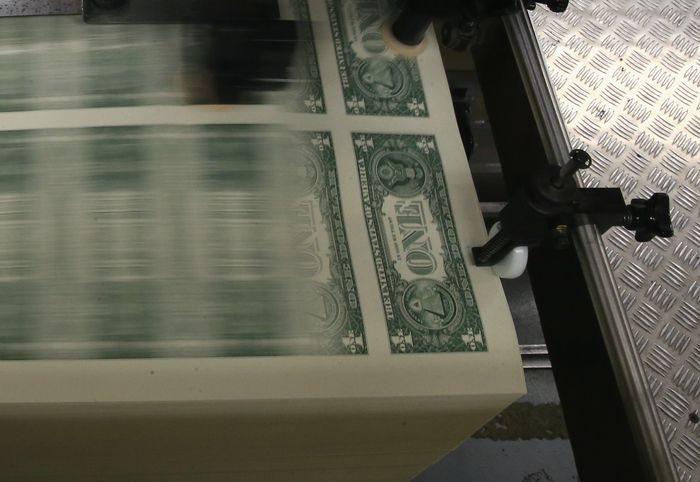Article Source: Market Watch
Written by: Jonathan Nicholson
Former Bush chief economist Mankiw warns interest rates may understate riskiness of deficits

In 1995, three up-and-coming economists wrote a paper saying it was possible for the government, under the right conditions, to run a deficit and keep refinancing the debt indefinitely, gambling it would never actually have to be paid off.
A quarter century and tens of trillions in federal debt later, the possibility raised by that paper is set to be put to the test as Washington ramps up the debate on post-pandemic stimulus spending. But one of the paper’s authors says policymakers shouldn’t be deceived about the downside risks.
“I think the world’s very uncertain, and in studying any policy we should also make sure always to think about how things can go wrong, not just how things go right,” Greg Mankiw, former chairman of the George W. Bush White House Council of Economic Advisers and author of a widely used economics textbook, told MarketWatch.
The other two authors also went on to become heavyweights in the economics world: Doug Elmendorf is a former Congressional Budget Office director and Laurence Ball is a professor and former department chair of economics at Johns Hopkins University.
Unlike in 1995, when the debate was over how fast to balance the budget, or even when the Barack Obama White House sought a balanced budget excluding interest payments, the Biden administration has yet to articulate a goal for its budget policy. Instead, it has focused initially on a second big stimulus package to boost the economy and now on two multi-trillion dollar proposals for infrastructure and social spending.
Mankiw called that approach shortsighted, saying “This is sort of the Alfred E. Neuman approach to fiscal policy: ‘What, me worry?’”
But in the 1995 paper, titled “The Deficit Gamble,” the trio wrote that as long as the average return of government debt, determined by interest rates, is lower than the average rate of economic growth, government debt TMUBMUSD10Y, 1.512% can likely be rolled over indefinitely, with only a modest chance — one or two in ten — of taxes needing to be raised to pay for it. The authors called it a “Ponzi gamble,” distinguishing it from a “Ponzi scheme” in that there was at least a chance of failure.
“A deficit is a gamble. It is an imprudent policy, because it imposes a significant burden on future generations in some realizations of history. But in most possible outcomes, the future effects are benign,” the economists wrote.
“Government budget deficits are more like a homeowner’s decision not to buy fire insurance. The policy is not advisable, because the adverse effects can be large, but these adverse effects occur with a low probability. Indeed, the result of the policy will be a higher living standard as long as the unlikely adverse outcomes do not happen to occur.”
Mankiw said now, though, both the key variables that would allow the deficit gamble to work — low interest rates and fast economic growth — are uncertain and the former may be artificially low because of recent changes in the economy.
Short-term, the economy is poised to continue a strong rebound from the COVID-19-induced slowdown in 2020, aided by pent-up consumer demand and the passage of the $1.9 trillion stimulus package. But Mankiw said longer-term issues, like climate change, productivity and the pace of technology advancement, make it unclear how strong growth will be ahead.
Mankiw says interest rates may be being held artificially low because the market power of companies is so great now it resembles that held by monopolies, a theory he has explored with Ball in a new paper. While most of the focus on monopolies is on their effects on consumer prices, Mankiw said, “the flip side of that is they also buy less inputs.”
“That tends to depress the factor prices of wages and interest rates relative to competitive markets,” he said.
Figuring out why interest rates are so low now and whether they will remain low for a long time is key, Mankiw said, to figuring out if the 1995 paper’s estimates that the deficit gamble would likely pay off are still accurate. He noted that while the amount of U.S. government debt has gone up, the costs of carrying it have actually fallen.
“If we were to write that paper today, we might have to think a little harder about what’s the right threshold to look at. Is it debt to GDP? Is it debt service to GDP? I don’t think economics has a clear answer to that question,” he said,
When Mankiw co-wrote the paper, public debt was almost equal to 50% of gross domestic product. It hit 100% in 2020 and the CBO’s long-term outlook estimates it will double to 202% by 2051, making it harder to pull off an endless rollover of debt. And thus making the “The Deficit Gamble” more relevant.
“I think it almost has more relevance now than when we wrote it, so that’s kind of fun,” Mankiw said.
